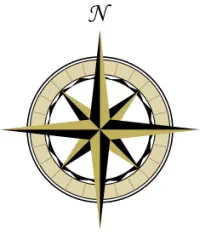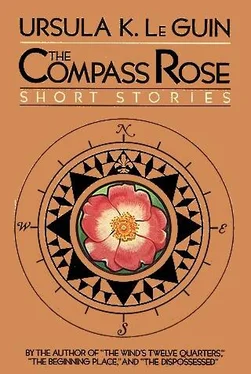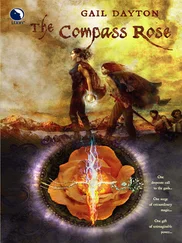Ursula Le Guin - The Compass Rose
Здесь есть возможность читать онлайн «Ursula Le Guin - The Compass Rose» весь текст электронной книги совершенно бесплатно (целиком полную версию без сокращений). В некоторых случаях можно слушать аудио, скачать через торрент в формате fb2 и присутствует краткое содержание. Жанр: Фантастика и фэнтези, на английском языке. Описание произведения, (предисловие) а так же отзывы посетителей доступны на портале библиотеки ЛибКат.
- Название:The Compass Rose
- Автор:
- Жанр:
- Год:неизвестен
- ISBN:нет данных
- Рейтинг книги:3 / 5. Голосов: 1
-
Избранное:Добавить в избранное
- Отзывы:
-
Ваша оценка:
- 60
- 1
- 2
- 3
- 4
- 5
The Compass Rose: краткое содержание, описание и аннотация
Предлагаем к чтению аннотацию, описание, краткое содержание или предисловие (зависит от того, что написал сам автор книги «The Compass Rose»). Если вы не нашли необходимую информацию о книге — напишите в комментариях, мы постараемся отыскать её.
From dream worlds to nightmare planets, through mazes of madness to tiny time holes in space, down Pathways of Desire to a New Atlantis, THE COMPASS ROSE points the way to the wonder-filled mind-country of a remarkable writer.
"As good as any contemporary at creating worlds, imaginary or our own… Le Guin writes with painstaking intelligence. Her characters are complex and haunting, and her writing is remarkable for it's sinewy grace."
—TIME Magazine
The Compass Rose — читать онлайн бесплатно полную книгу (весь текст) целиком
Ниже представлен текст книги, разбитый по страницам. Система сохранения места последней прочитанной страницы, позволяет с удобством читать онлайн бесплатно книгу «The Compass Rose», без необходимости каждый раз заново искать на чём Вы остановились. Поставьте закладку, и сможете в любой момент перейти на страницу, на которой закончили чтение.
Интервал:
Закладка:
Gwilan never spoke of wanting another harp. But about the time her wrist was healed, old Uliad had a travelling musician bring her one on loan; when he had an offer to buy it at its worth, he sent for it back again. At that time Torm would have it that there was money from selling three good heifers to the landowner of Comin High Farm, and the money should buy a harp, which it did. A year or two later an old friend, a flute player still on his travels and rambles, brought her a harp from the South as a present. The three-heifers harp was a common instrument, plain and heavy; the Southern harp was delicately carved and gilt, but cranky to tune and thin of voice. Gwilan could draw sweetness from the one and strength from the other. When she picked up a harp, or spoke to a child, it obeyed her.
She played at all festivities and funerals in the neighborhood, and with the musician’s fees she bought good strings; not Uliad’s strings, though, for Uliad was in his grave before her second child was born. If there was a music day nearby she went to it with Torm. She would not play in the competitions, not for fear of losing, but because she was not a harper now, and if they did not know it, she did. So they had her judge the competitions, which she did well and mercilessly. Often in the early years musicians would stop by on their travels and stay two or three nights at Torm; with them she would play the Hunts of Orioth, the Dances of Cail, the difficult and learned music of the North, and learn from them the new songs. Even in winter evenings there was music in the house of Torm: she playing the harp—usually the three-heifers one, sometimes the fretful Southerner—and Torm’s good tenor voice, and the boys singing, first in sweet treble, later on in husky unreliable baritone; and one of the farm’s men was a lively fiddler; and the shepherd Keth, when he was there, played on the pipes, though he never could tune them to anyone else’s note. “It’s our own music day tonight,” Gwilan would say. “Put another log on the fire, Torm, and sing ‘The Green Leaves’ with me, and the boys will take the descant.”
Her wrist that had been broken grew a little stiff as the years went on; then the arthritis came into her hands. The work she did in house and farm was not easy work. But then who, looking at a hand, would say it was made to do easy work? You can see from the look of it that it is meant to do difficult things, that is is the noble, willing servant of the heart and mind. But the best servants get clumsy as the years go on. Gwilan could still play the harp, but not as well as she had played, and she did not much like half measures. So the two harps hung on the wall, though she kept them tuned. About that time the younger son went wandering off to see what things looked like in the North, and the elder married and brought his bride to Torm. Old Keth was found dead up on the mountain in the spring rain, his dog crouched silent by him and the sheep nearby. And the drouth came, and the good year, and the poor year, and there was food to eat and to be cooked and clothes to wear and to be washed, poor year or good year. In the depth of a winter Torm took ill. He went from a cough to a high fever to quietness, and died while Gwilan sat beside him.
Thirty years, how can you say how long that is, and yet no longer than the saying of it: thirty years. How can you say how heavy the weight of thirty years is, and yet you can hold all of them together in your hand lighter than a bit of ash, briefer than a laugh in the dark. The thirty years began in pain; they passed in peace, contentment. But they did not end there. They ended where they began.
Gwilan got up from her chair and went into the hearth room. The rest of the household were asleep. In the light of her candle she saw the two harps hung against the wall, the three-heifers harp and the gilded Southern harp, the dull music and the false music. She thought, “I’ll take them down at last and smash them on the hearthstone, crush them till they’re only bits of wood and tangles of wire, like my harp.” But she did not. She could not play them at all any more, her hands were far too stiff. It is silly to smash an instrument you cannot even play.
“There is no instrument left that I can play,” Gwilan thought, and the thought hung in her mind for a while like a long chord, till she knew the notes that made it. “I thought my harp was myself. But it was not. It was destroyed, I was not. I thought Torm’s wife was myself, but she was not. He is dead, I am not. I have nothing left at all now but myself. The wind blows from the valley, and there’s a voice on the wind, a bit of a tune. Then the wind falls, or changes. The work has to be done, and we did the work. It’s their turn now for that, the children. There’s nothing left for me to do but sing. I never could sing. But you play the instrument you have.” So she stood by the cold hearth and sang the melody of Orioth’s Lament. The people of the household wakened in their beds and heard her singing, all but Torm; but he knew that tune already. The untuned strings of the harps hung on the wall wakened and answered softly, voice to voice, like eyes that shine among the leaves when the wind is blowing.
Malheur County

“Edward,” said his mother-in-law, “face the facts. You can’t withdraw from your life. People aren’t going to let you. You’re too useful, too likable, too good-looking even, though you don’t seem to be aware of it.” She paused for breath, then said in a colder voice, “I used to wonder if Mary was really aware of it.”
He sat silent across the hearth from her, huddled up over his long arms and legs.
“You can’t withdraw from something you haven’t got into! Oh, I’m sorry,” she said savagely.
He smiled, but looked a little punch-drunk.
“The Navajo Indians,” she said, “I think, don’t let mothers-in-law and sons-in-law speak to one another. It’s tabu. A very sensible arrangement. We’re so damned sophisticated, no tabus, no defenses.” She fell grimly silent, a grey-haired, full-figured woman in her sixties sitting erect in an armchair in the firelight. She always sat erect. The cigarette in her left hand and whiskey glass in her right appeared as elements of her rugged femininity. She came from eastern Oregon, from Malheur County, the last, barren frontier, from a decent feckless family that had left a century of failed farms, male suicides, and infant graves across the land from Ohio to the Coast, pushing always unprofitably westward.
“Of course she knew that you were good-looking,” she went on thoughtfully, “she was proud of it. But I never saw that she got much pleasure out of it. Not as you took pleasure in her, real joy.”
He was only twenty-seven. Leaning forward to toss her cigarette into the fire Harriet Avanti saw, through her shrewdly rambling thoughts and the press of various emotions, his face; and the rest dropped clear away. “I shouldn’t think aloud,” she said, “I didn’t mean to hurt you.”
“You don’t. You can’t.” He turned his kind, somber young face to her, reassuring.
“But I do. You’re sensitive, and I’m not. You’re guilt-ridden, and I don’t even know what guilt is.”
But again she had touched a nerve; he frowned, and spoke: “No, I’m not guilt-ridden, Harriet. It wasn’t my fault. It’s not my fault that I survive. Only I don’t see the point.”
“The point!” She sat erect, moveless. “There is no point.”
Staring at the fire he whispered, “I know.”
They were silent a good while. Harriet thought of her daughter Mary, the beautiful dissatisfied child. “This is Edward, Mother.” And the young man watching the girl with incredulous, delighted passion—oh, it had been he, alone, who had roused Harriet from her long drab grief after her husband’s death, who had shown her once again, from the flat plain and barren land, the incredibly high peaks. He had reminded her that after all there is more in life than endurance. For unfortunately, as she knew, endurance was her native style. She would have endured right through life, steady and heavy as a rock, if she hadn’t had the luck to meet and marry John Avanti, who taught her joy. He dead, she had fallen back at once upon endurance, and never would have known delight again if her daughter had not marched in one night with the tall radiant boy: “This is Edward, Mother.”
Читать дальшеИнтервал:
Закладка:
Похожие книги на «The Compass Rose»
Представляем Вашему вниманию похожие книги на «The Compass Rose» списком для выбора. Мы отобрали схожую по названию и смыслу литературу в надежде предоставить читателям больше вариантов отыскать новые, интересные, ещё непрочитанные произведения.
Обсуждение, отзывы о книге «The Compass Rose» и просто собственные мнения читателей. Оставьте ваши комментарии, напишите, что Вы думаете о произведении, его смысле или главных героях. Укажите что конкретно понравилось, а что нет, и почему Вы так считаете.




